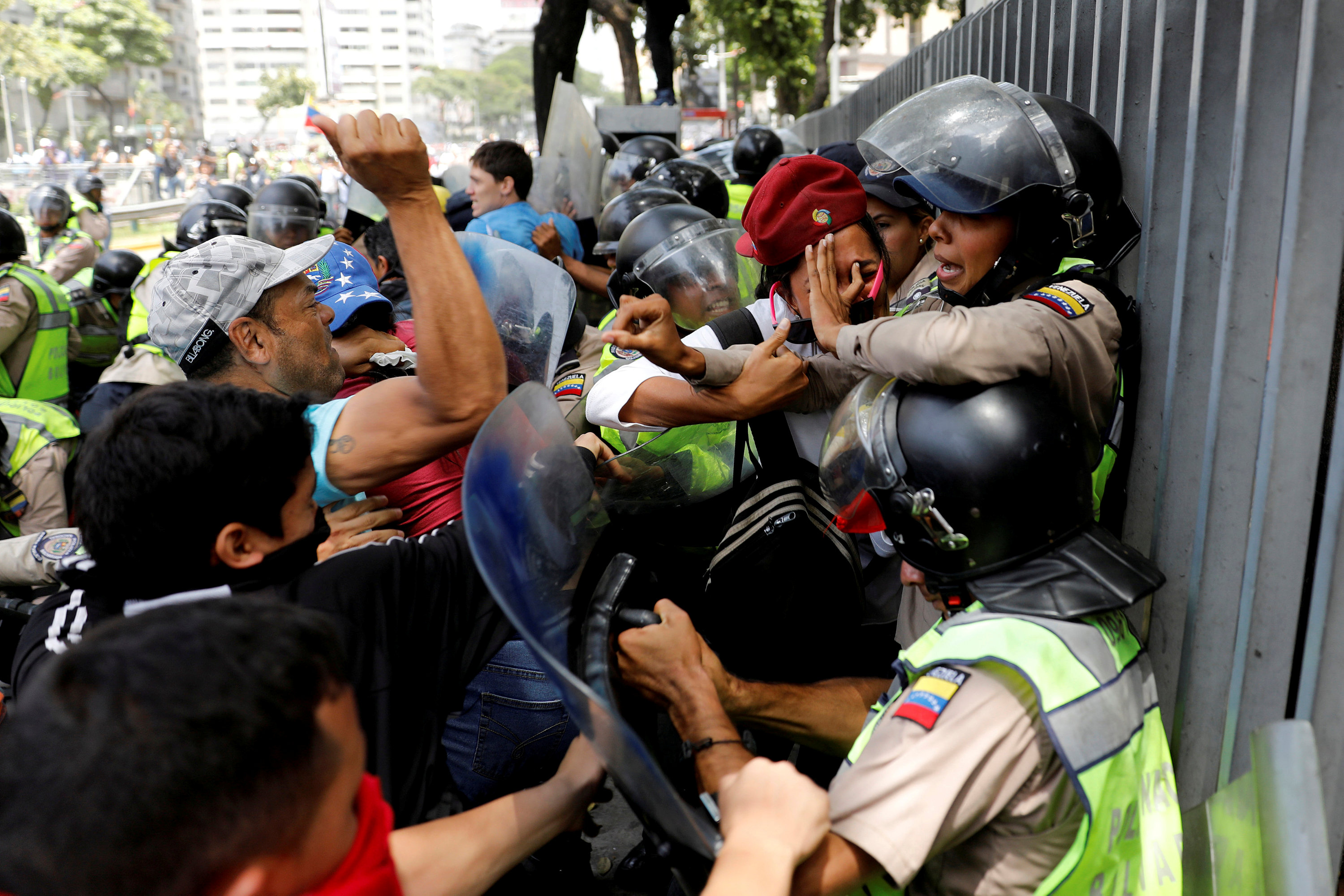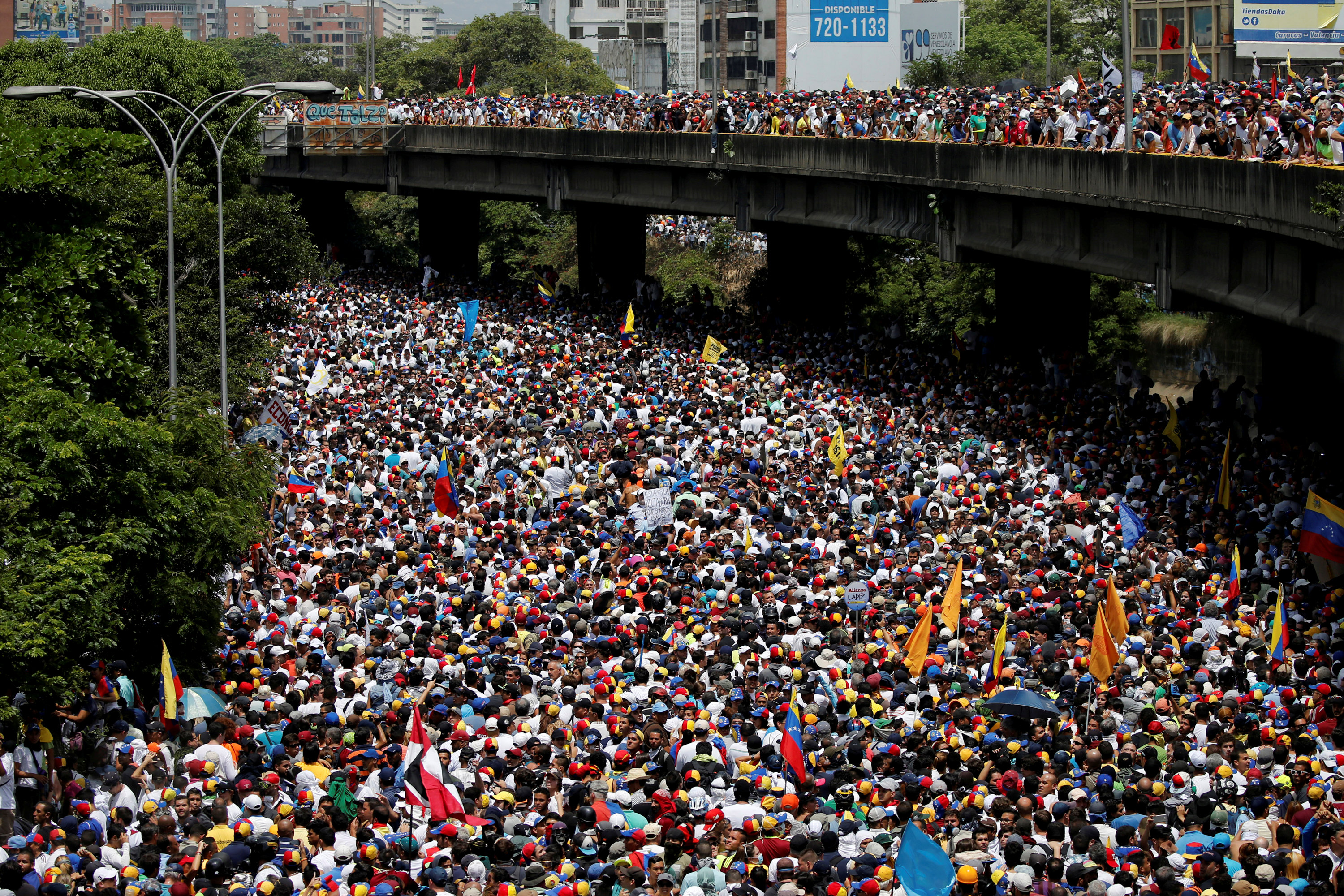
By Anthony Boadle
BOA VISTA, Brazil (Reuters) – Last August, Victor Rivera, a 36-year-old unemployed baker, left his hometown in northern Venezuela and made the two-day journey by road to the remote Amazonian city of Boa Vista, Brazil.
Although work is scarce in the city of 300,000 people, slim prospects in Boa Vista appeal more to Rivera than life back home, where his six children often go hungry and the shelves of grocery stores and hospitals are increasingly bare.
“I see no future in Venezuela,” said Rivera, who seeks odd jobs at traffic lights in the small state capital just over 200 km (124 miles) from Brazil’s border with the Andean country.
Countries across Latin America and beyond have received a growing number of Venezuelans fleeing economic hardship, crime and what critics call an increasingly authoritarian government.
The once-prosperous country, home to the world’s largest proven oil reserves, is struggling with a profound recession, widespread unemployment, chronic shortages and inflation that the opposition-led Congress said could soon top 2,000 percent.
At least 125 people died this year amid clashes among government opponents, supporters and police.
As conditions there worsen, nearby cities like Boa Vista are struggling with one of the biggest migrations in recent Latin American history. With limited infrastructure, social services and jobs to offer migrants, Brazilian authorities fear a full-fledged humanitarian crisis.
In Roraima, the rural state of which Boa Vista is the capital, the governor last week decreed a “social emergency,” putting local services on alert for mounting health and security demands.
“Shelters are already crowded to their limit,” said George Okoth-Obbo, operations chief for the United Nations High Commission on Refugees, after a visit there. “It is a very tough situation.”
He noted the crush of migrants also hitting Trinidad and Tobago, the Caribbean country to Venezuela’s north, and Colombia, the Andean neighbor to the west, where hundreds of thousands have fled.
Not even Venezuela’s government knows for certain how many of its 30 million people have fled in recent years. Some sociologists have estimated the number to be as high as 2 million, although President Nicolas Maduro’s leftist government disputes that figure.
BRAZIL “NOT READY”
Unlike earlier migration, when many Venezuelan professionals left for markets where their services found strong demand, many of those leaving now have few skills or resources. By migrating, then, they export some of the social ills that Venezuela has struggled to cope with.
“They’re leaving because of economic, health and public safety problems, but putting a lot of pressure on countries that have their own difficulties,” said Mauricio Santoro, a political scientist at Rio de Janeiro State University.
International authorities are likening Venezuela’s exodus to other mass departures in Latin America’s past, like that of refugees who fled Haiti after a 2010 earthquake or, worse, the 1980 flight of 125,000 Cubans by boat for the United States.
In Brazil, Okoth-Obbo said, as many as 40,000 Venezuelans have arrived. Just over half of them have applied for asylum, a bureaucratic process that can take two years.
The request grants them the right to stay in Brazil while their application is reviewed. It also gives them access to health, education and other social services.
Some migrants in Boa Vista are finding ways to get by, finding cheap accommodation or lodging in the few shelters, like a local gym, that authorities have provided. Others wander homeless, some turning to crime, like prostitution, adding law enforcement woes to the social challenges.
“We have a very serious problem that will only get worse.” said Boa Vista Mayor Teresa Surita, adding that the city’s once quiet streets are increasingly filled with poor Venezuelans.
Most migrants in Boa Vista arrive by land, traveling the southward route that is the only road crossing along more than 2,100 kms of border with Brazil.
Arriving by public transport in the Venezuelan border town of Santa Elena, they enter Brazil on foot and then take buses or hitch rides further south to Boa Vista.
Staffed only during the day, the border post in essence is open, allowing as many as 400 migrants to enter daily, according to authorities. For a state with the lowest population and smallest economy of any in Brazil, that is no small influx.
“Brazil’s government is not ready for what is coming,” said Jesús López de Bobadilla, a Catholic priest who runs a refugee center on the border. He serves breakfast of fruit, coffee and bread to hundreds of Venezuelans.
Despite a long history of immigration, Latin America’s biggest country has struggled this decade to accommodate asylum seekers from countries including Haiti and Syria. Although Brazil has granted asylum for more than 2,700 Syrians, the refugees have received scant government support even in Sao Paulo, Brazil’s richest state.
A senior official in Brazil’s foreign ministry, who asked to remain anonymous, said the country will not close its borders. Okoth-Obbo said his U.N. agency and Brazil’s government are discussing ways to move refugees to larger cities.
“NOW I CAN SLEEP”
Boa Vista schools have admitted about 1,000 Venezuelan children. The local hospital has no beds because of increased demand for care, including many Venezuelan pregnancies.
In July, a 10-year-old Venezuelan boy died of diphtheria, a disease absent from Roraima for years. Giuliana Castro, the state secretary for public security, said treating ill migrants is difficult because they lack stability, like a fixed address.
“There is a risk of humanitarian crisis here,” she said.
Most migrants in Boa Vista said they do not intend to return to Venezuela unless conditions there improve.
Carolina Coronada, who worked as an accountant in the northern Venezuelan city of Maracay, arrived in Brazil a year ago with her 7-year-old daughter. She has applied for residency and works at a fast-food restaurant.
While she earns less than before, and said she makes lower wages than Brazilians at the restaurant, she is happier.
“There was no milk or vaccines,” she said. “Now I can sleep at night, not worried about getting mugged.”
Others are faring worse, struggling to find work as Brazil recovers from a two-year recession, its worst in over a century.
One recent evening, dozens of young Venezuelan women walked the streets of Caimbé, a neighborhood on Boa Vista’s west side.
Camila, a 23-year-old transsexual, left Venezuela nine months ago. She said she turns tricks for about $100 a night – enough to send food, medicine and even car parts to her family.
“Things are so bad in Venezuela I could barely feed myself,” said Camila, who declined to give her last name.
Rivera, the unemployed baker, one afternoon sheltered from the equatorial sun under a mango tree. He has applied for asylum and said he is willing to miss his family as long as he can wire his earnings from gardening, painting and bricklaying home.
“It’s not enough to live on, but the little money I can send home feeds my family,” he said.
(Reporting by Anthony Boadle. Additional reporting by Alexandra Ulmer in Caracas. Editing by Paulo Prada.)











